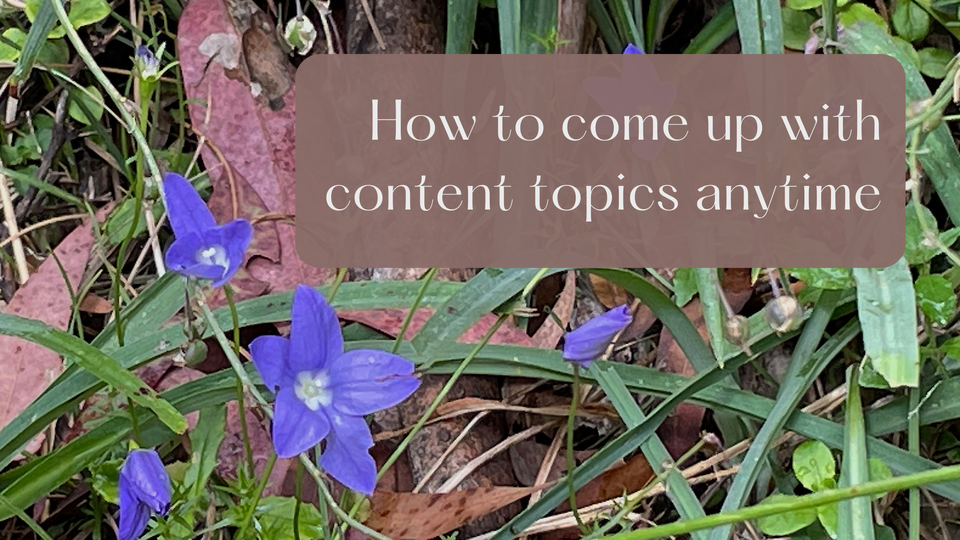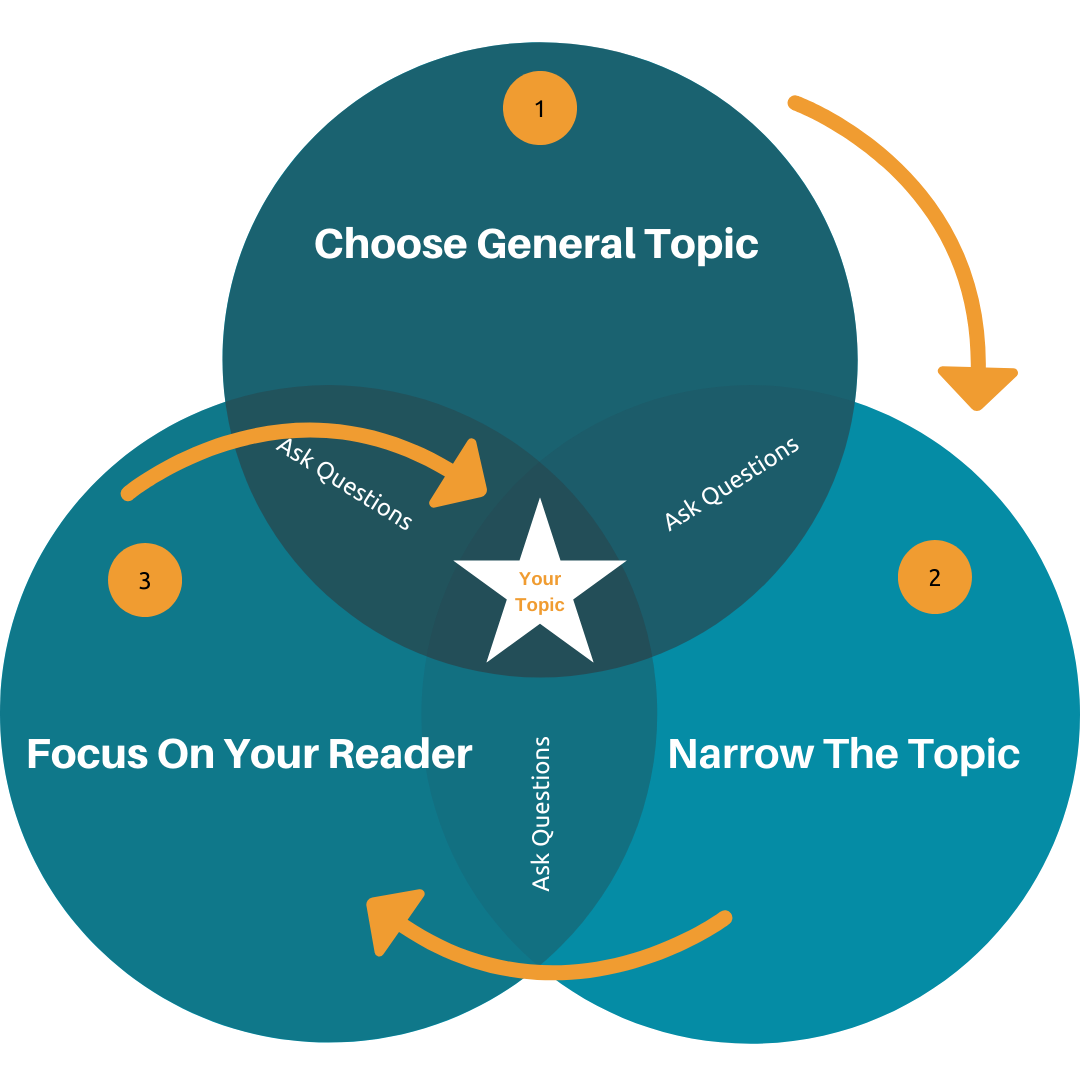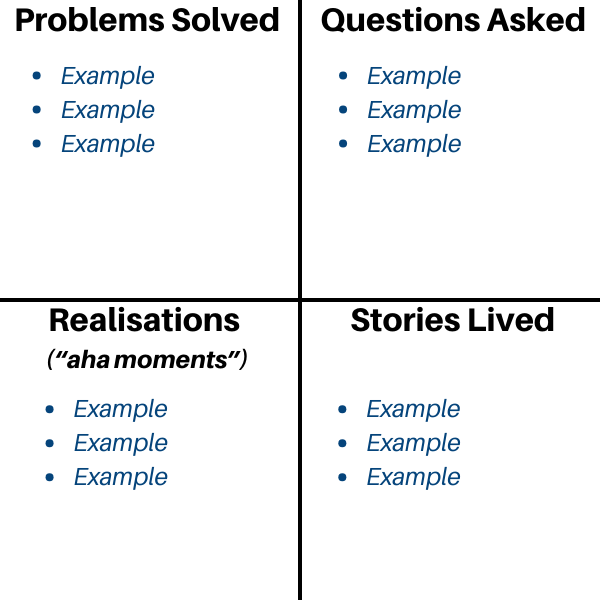How To Easily Come Up With Topics To Write (Or Talk) About

Are you struggling to come up with topic ideas week after week after week?
Whether you host a podcast, write blog posts or need to pitch ideas to pick up writing gigs, there’s nothing more demoralising than staring at a blank screen and not being able to come up with any useful ideas.
I know the feeling all too well. I’m a podcaster, a business owner and a writer. My podcasts are published weekly. I send out regular email newsletters to 3 different audiences and write several blog posts every month.
Coming up with ideas to talk or write about used to be one of the toughest challenges I faced when it came to consistently creating content.
So I want to share with you the topic generation process I use that works brilliantly time after time after time to help me come up with great content ideas. And not just any old topic ideas, but things that are relevant and helpful for my audiences.
It Might Be Obvious, But …
Because it can be easy to forget the basics, I’m going to mention some things you already know. But just because they are obvious doesn’t mean we always remember them when it comes to thinking up topics to write (or talk) about.
- You have to know who you’re talking to or writing for.
- It helps a lot if you know what those people are interested in.
- You need to know whether you’re helping them solve a problem or fulfill a desire.
Once you have clarity on those things, it’s time for the next step.
And as I go through this next step, I’m going to do it wearing my podcaster, newsletter writer and blog post writer hats.
Have A Content Strategy
When I was relatively new to the world of online business and content creation, I’d just pick whatever was top of mind or had caught my attention and write something about that.
However, I’ve learned over time that I get much better results if my topics are tied back to an overarching theme or strategy. A specific goal, if you like, for why I’m writing in the first place.
For example, when I write newsletters for the people on my themenopauseeffect.com email list, I’m specifically focusing on topics that are related to perimenopause or menopause and how to deal with the challenges that come with recognising and coping with the many myriad ways that menopause can affect people.
When I’m writing for the people on my freelancewritersonline.com email list, I’m focusing on topics that will encourage, inform and help new, emerging and established writers get paid for their writing.
And for my onlinebusinessliftoff.com email list people, I share my experiences and what I’ve learned about building an online business. I talk about what went right and what didn’t with the various projects I’ve done.
And I have a content strategy for each of those audiences and websites, something that I learned how to do from expert content strategist and writer Treasa Edmond’s Content Strategy Mastery Bootcamp.
Now you might think that those 3 audiences I mentioned are completely different … and in some respects they are. However, it is entirely possible to be someone going through menopause, who is a writer and who wants to build their writing into a sustainable online business.
So as I explain my process for coming up with topics, I want you to think about how you could take the principles I’m sharing and apply them to your own target audience.

My 3-Phase Topic Generation Process
There are 3 phases to my process of coming up with topics. Sometimes these 3 phases can happen quite quickly, one right after the other. Sometimes, there can be time gaps between them, as I think about where I want to take a particular article or podcast episode so that I can achieve a specific goal with it.
Let’s pretend for a moment that I’ve decided I want to write a non-fiction blog post about something historical.
This is not so far-fetched as it sounds. Back in ancient times when my children were small, I used to write non-fiction articles and get paid for it. And believe it or not I majored in History at university my first time around.
Now, obviously, if an editor has already asked you to write a piece, you’ll write about what THEY want. Or if you’re a guest on someone’s podcast, they’ll have specific ideas for what they want to cover off in your interview.
So for purposes of this example, let’s assume that I’m going to come up with my own topic for this non-fiction history blog post and pitch the idea to an editor.
And it may help If you think of these questions in terms of a Venn diagram … you know, like the one below where there’s at least 3 intersecting circles and a sweet spot in the center where they all overlap?
Phase 1: The Starting Point
The very first thing I do when trying to come up with topics these days (especially for my podcast), but also for my newsletters and blog posts, is to use something I learned from Kevin Chemidlin from Grow The Show podcast, Episode 163.
He calls it the calendar review method, but the acronym he uses when he explains his method is PQRS, so that’s what stuck in my head.
Basically the method involves sitting down at the end of the week with your calendar and notes or journal from the week. As you review the meetings in your calendar plus any notes you’ve taken, you’re going to be looking for:
- Problems you’ve helped solve or had solved for you
- Questions that your clients or customers have asked you
- Any realisations you’ve arrived at
- Any stories you’ve lived through
It’s such a useful way of starting the process of choosing a topic.
When I go through this technique, I like to use a 2x2 grid and write one of those PQRS words in each grid. What I very quickly discovered is that a common thread will pop out for the week. Something quite meaty and chunky that I know will be helpful if I talk or write about it.

And you don’t have to limit yourself to your own calendar or life. Use these questions on someone else, either living or some historical figure from the past.
So uring our Venn Diagram, Circle 1 would ask (and answer) the question - what’s the PQRS you chose out of your weekly calendar review? Whatever topic thread you’ve picked should still be phrased in general terms. You don’t want to nail the topic down completely just yet.
Phase 2: Narrow Down The General Topic
Next, for Phase 2 of this process, I narrow down the topic by asking myself a few questions. And I start with Circle 2 of the Venn Diagram where I ask (and answer) these two questions.
Question 1: What’s my focus?
Do I want to make the main focus of what I write (or talk) about people, places, things or events?
Oftentimes I’ll choose to write about people because I find them fascinating. Ordinary people can live such extraordinary lives and we don’t even know it.
For example, when I was at university, I used to live next door to an elderly gentleman who would pay me to do odd jobs around his yard. He had a really strong German accent and didn’t seem to have any family around. But despite his age, every morning, he used to put on an old pair of army boots and go jogging.
And because I have a fairly active imagination, I used to secretly wonder whether he was an ex-German soldier from WWII who had chosen to rebuild his life somewhere else after the war.
To this day, I wish I’d asked him about his past and why he went jogging in army boots.
Question 2: Do I want to cover things from a local, regional, national or global perspective?
This is an important question to ask because it can hugely widen or narrow the scope of the topic. For example, with a global perspective, we could ask what life is like for ex-soldiers who move to other countries to try to rebuild their lives.
Example In Action
Okay. So let’s quickly review where my example blog post topic has gotten to.
My PQRS exercises from the last 2 weeks has highlighted a common problem that my husband and I go through every year.
And that is?
Well, both of us ALWAYS … and I’m not kidding, it is always … forget our wedding anniversary on the day. I have no idea why. We’ve been married for 40 years, so you’d think anniversaries would be a big deal.
But nope. It just slips out of our consciousness like water into sand. So that problem goes into Circle 1 as a general note about forgetfulness when it comes to important family dates, like anniversaries.
Which makes asking and answering the question about focus for Circle 2, people, places, things, events, etc., really easy to do. It’s a mix of people and supposedly important family-based events.
And for the question about which level to focus at (local, regional, national, global), I’ve decided to focus on local or maybe even at the family level.

Finishing Phase 2
Okay. Now we’re ready to finish the 2nd phase. And we do this by narrowing down the topic even more by observing how each of the Venn Diagram circles intersects with the others.
Let’s dive a bit deeper by asking questions that start to hone in on different aspects of the topic, as it’s been narrowed down so far.
So keeping in mind our non-fiction blog post example, I’d ask …
- “Is there a relevant watershed moment in my own life or from my own family that relates to this partially formed topic?”
Talking about personal experiences is a great way of finding a topic and then introducing it to your readers. For purposes of my example, the answer to that question is pretty simple … my husband and I have now accumulated 40 years worth of big OOOPS’s when it comes to remembering our anniversary on the exact day.
- “Is there a watershed moment from someone else’s life that would be relevant to share?”
For example, when I was a child, my dad’s parents lived with us for a number of years.
And I thought my grandad was the most fascinating person ever. He used to sing folk songs (which I loved) and play pranks on people (which I didn’t love).
But the watershed moments in his life were sad. Both of my granddad’s parents were dead from the flu by the time he was 7, so he’d been farmed out to live with a physically abusive uncle.
By the time my grandad was 14, he was living alone and supporting himself. Which meant that even though he loved learning, he never got past the 6th grade because he had to work to live.
Think about how many non-fiction, historical topics could come out of that short watershed moment synopsis!
Here’s another question worth asking.
- “What event has or is shaping the world or the world around me?”
There is still plenty more to say about COVID, even if we’re sick of hearing about it ourselves. And plenty of unique angles to choose from.
- The personal angle – how did it affect you or your family?
- The community angle – how did it affect a particular town?
- An economic angle – how did it affect the things you can buy now?
- A future history angle – what will be the long-term impact on the children who started school during COVID?
I like this next question.
- “Can you identify an event that shaped history, then identify a small thing, that, if it had been changed, history would now be completely different?”
For example, what would my life be like now if I hadn’t chosen to take a year off university to do volunteer work?
It’s true that this particular question is probably more likely to generate fiction, than non-fiction. I always think of movies like Sliding Doors or The Man In The High Castle (affiliate links), when I ask these “what if” questions, so I usually tend not to go there.
But if you did want to use this question, you could always then ask this.
"Well, what about people who DIDN’T take a year off of university (or whatever your example is)? Did their lives turn out to be appreciably different? "
And finally, here’s my favourite question for finding topics.
- “What’s something I’ve seen or read recently that makes me go “hmmm. I wonder …”
For example, headstones in a cemetery or something you’ve seen while traveling or a question your child or grandchild has asked.
By the time you get to this part of the process, you’ll find that you’ve been able to narrow the topic down a little more, and a little more until you finally have a specific, clear, very interesting topic.
More Of Our Example In Action:
Let me give you one more example of how Phases 1 and 2 work together to help you come up with and then narrow down your topic.
Shahan, someone I used to coach, writes about history in his blog, Throughout History.
But he typically writes about history (his general topic) from the perspective of how it intersects with antiques (especially antique pens or things made out of silver) and/or his family’s Chinese Malaysian, Peranakan cultural background, which I find quite interesting.
That combination of a more generalised topic (history), plus the niched down or narrowed lenses he uses (antiques, culture), gives Shahan pretty much an infinite number of things to write about. And this is all without him having to stare at a blank screen for ages and then give up.
Okay. So now it’s time to move to the last stage of the topic selection process.

Phase 3: Shaping And Nuancing Your Topic So It Interests Others
I think of this 3rd part of the process as shaping the final nuances of the topic.
And I do that by asking “why”.
Why do other people want to know about certain topics? I know why I’M interested, but why are THEY curious about those topics in particular?
So if you were trying to come up with a topic that would interest me, here’s what you need to know.
When I was in 5th and 6th grade I had a teacher who used to read to us every day for half an hour after our lunch break/recess. And what he read shaped my interests for years to come.
Granted, the stories he read were fiction, but it was fiction set in real events … historical events that had hugely shaped the country I lived in. Those mesmerising books were often about what it was like to live through a war as a child.
And I was hooked.
I’d close my eyes and listen raptly as my teacher read to us. Books like Johnny Tremain which tells the story of a young teenage boy growing up during the American Revolution and Across 5 Aprils (affiliate links), about a young teenage boy living through the American Civil war.
Because of those books, I later went on to devour non-fiction, historical accounts of World War II. Books like the The Ultra Secret, The Man Who Never Was (affiliate links) and countless other books.
And that lead to me, as I mentioned earlier, majoring in history when I went to university. So much more fun and interesting than Calculus, let me tell you!
My point is, if you think about the reason(s) OTHER people are interested in specific topics, it makes it much easier to pick topics that:
- Evoke surprise for the reader
- Drive home a truth they’ve newly grasped
- Provide a mystery to mull over
Or maybe those specific topics were front page news years ago and now people are curious about exactly WHY they were news back then. Or what lessons they might learn from those yesteryear events.
So when you think about potential topics from someone else’s point of view, ask this question.
- “What things might be obvious to you (either from their presence or their absence) that aren’t so obvious to the people you are writing for.”
In other words, where are the gaps in the story? What are those gaps and who wants to know what they are and why the gaps exist?

Wrapping It All Up
So here’s the final, not-so-secret, secret to choosing a great topic.
Curiosity is the key to it all. If you engage your sense of curiosity, you’re going to find it much so much easier to come up with topics.
Knowing what you’re interested in yourself, also helps. But the kicker is knowing what your readers are interested in and why.
Our Example In Action - Finished
So let’s go back to this non-fiction, historical topic that I’m coming up with.
I started with my general topic, “history”, worked my way through the process to decide I want to focus on an event from my family’s history and then explore how it intersects with current events.
To be more precise, my question is now this:
“How did deaths from the flu epidemic of the early 1900’s impact on today’s society (or more precisely, on me)? Have we learned anything that we might be able to apply in the future as we start to uncover the long-term impacts of COVID on people and society?
Most importantly, can I blame the too-early deaths of my great-grandparents on my complete (and embarrassing) inability to remember my own anniversary?”
So there you have it. That’s my process for coming up with topics.
- I use the PQRS (problem, question, realisation, story) method to choose a general topic.
- I narrow the topic by asking questions and visually showing those answers with a Venn diagram.
- Lastly I add in extra nuance to the topic by thinking about how others might be interested in that same topic and why. What questions would they want to have answered in non-fiction, historical blog posts?
Now, you may be wondering why I don’t just go straight to the search engines or webistes like answerthepublic.com and pop in keywords and keyword phrases? Or even use ChatGPT or some other AI engine?
Because in order to do that you have to know where to start. You need to know which keywords and phrases to use. Which means you need to know what topic to research and we’re back at our original, square one question ... "what’s my topic?
And that's why I’ve shared my 3-stage, curiosity-based Venn diagram-type approach with you. And as a bonus for getting all the way through this long post, you are welcome to download your free copy of my Quickstart Guide To Choosing An Engaging Topic Every Time.
I hope you’ve found that useful.
Please note that as an Amazon Associate, we earn from qualifying purchases. That means that if you click on one of our affiliate links (these are clearly identified) then we will receive a small commission, for which we thank you. It helps us keep on providing informative posts that help you build your freelance writing career and business.






Member discussion